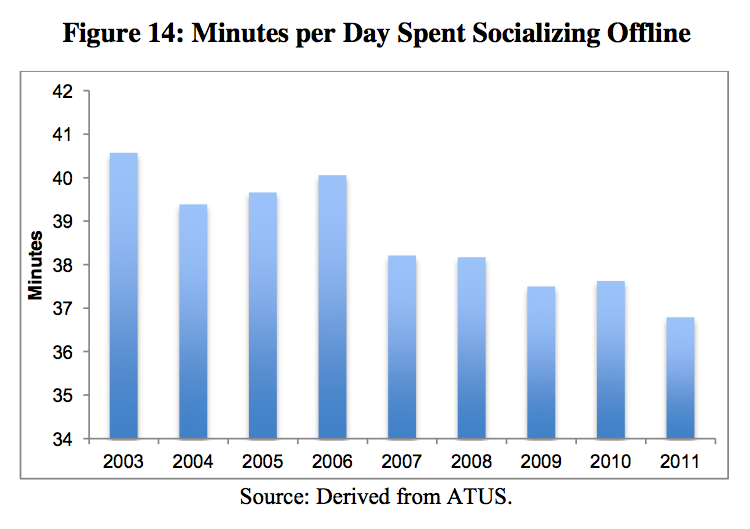
Surfing Alone: How More Time Online Cuts Into Everything Else
According to new report on online usage trends, we're giving up more time—and a lot of real-world activities, like in-person communication—when we spend our time surfing the web. Is that a good or bad thing?
According to new report on online usage trends, we’re giving up more time—and a lot of real-world activities, like in-person communication—when we spend our time surfing the web. Is that a good or bad thing?
Here’s a quandary for the internet age: As our devices connect us to more people than ever, we’re way less connected to all of the people and activities we could be spending time on instead.
A new study shows just how much we’re losing out on opportunities to work, socialize, and otherwise interact with the world around us. The Tech Policy Institute’s Scott Wallsten has analyzed information from the American Time Use Survey (ATUS) from 2003 through 2011, which looks at online usage. His results, released in a recent working paper by the National Bureau of Economic Research, disclosed some interesting facts.
Offline leisure loses out: Wallsten found that ATUS respondents were spending more time online from year to year—and he was able to determine what they were simultaneously doing less of. Each 10 minutes spent online corresponded to less offline leisure time (2.9 minutes), less time working (2.7 minutes, or 3.75 minutes for those in their 30s), and less time for self-care (1.2 minutes). Breaking these numbers down further showed smaller costs to some activities—less in-office socializing, sleep, or personal reflection time—that could have larger ramifications later. As Simone Foxman of Quartz notes regarding the study, “Computer leisure still comprises a mere 13 minutes of the five hours of leisure time the average American has in the day. Even so, this computer time has a notable impact, eating into things like sleep, work, travel, and household chores.”

Why this matters: For associations, this trend could be something to keep a close eye on. Why’s that? Along with the rise in computing time, the study found a significant decline in time spent on in-person socializing over the eight-year period. From 2003 to 2011, the average person spent less time on social activities, including attending parties and cultural events, as well as various forms of education. “In short, these results based on ATUS data suggest that a cost of online activity is less time spent with other people,” Wallsten writes—a red flag for associations, where in-person networking and collaboration are critical parts of their value to members. On the other hand, The Washington Post‘s Caitlin Dewey offers a good counterpoint: “[W]hile Wallsten concludes, rather forebodingly, that ‘a cost of online activity is less time spent with other people,’ that fails to account for the zillion social connections that people form, and nurture, online.” And many of those online connections are being facilitated by associations, although the survey suggests that it may be worth considering ways to reinvigorate those connections beyond the computer.
How do you find online usage affects the rest of your life? Tell us your thoughts in the comments below.
(Hemera/Thinkstock)






Comments